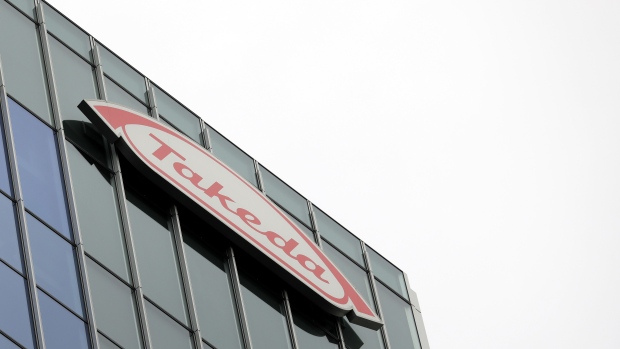Mar 17, 2020
Drugmaker Takeda Sees Speedy Approval of Coronavirus Treatment
, Bloomberg News

(Bloomberg) --
Takeda Pharmaceutical Co. said its blood plasma-derived therapy against coronavirus currently in development has the potential to be among the first approved treatments for the deadly pathogen.
The Japanese pharmaceutical company could have an edge because the treatment involves a process that already has approval from regulators. The key point in negotiations with regulators for approval is whether it has the necessary concentration of the antibody, or titer, needed to fight the Covid-19 disease, said Julie Kim, Zurich-based president of Takeda’s plasma-derived therapies unit.
The process to manufacture the therapy, using antibodies from recovered patients, is the same as Takeda’s other immunoglobulin products, which have approval from regulatory bodies around the world including the U.S. Food & Drug Administration, Kim said. The company has not yet tested the therapy on any coronavirus patients.
“We don’t have to demonstrate safety, we just have to agree with the regulatory agencies on how to demonstrate that the titer of antibody present in the final product is sufficient to be effective against the disease,” Kim told Bloomberg in a phone interview. She said the response from the FDA and European Medicines Agency would be key to the timing for approval, which could be as early as in nine months.
The idea of using the blood of recovered patients with immunity to fight a disease goes back over a century, and was used during the recent H1N1 and Ebola epidemics.
A paper from researchers at Johns Hopkins University published March 13 highlighted the potential efficacy of using blood of recovered patients, but more as a preventative measure or early on in the disease rather than treating serious cases. However, China National Biotec Group Co. has been using such plasma to treat seriously ill patients since Feb. 8, and claims they improved within 24 hours.
Takeda is one of many pharmaceutical companies racing to find a treatment for the coronavirus that has swept across the globe, killing more than 7,000. The U.S. has been granting fast-track approvals for drugmakers developing therapies, and Gilead Sciences Inc. and AbbVie Inc. have emerged as front-runners for potential treatments.
A roundtable of pharmaceutical executives told U.S. President Donald Trump this month that antiviral medications could be available for patients in a matter of months. Vaccines, which would prevent healthy people from contracting the disease, are further from reaching doctors’ offices and pharmacy shelves.
Takeda announced earlier this month it began developing a plasma-derived therapy to treat serious cases of coronavirus. The treatment depends on the company’s ability to obtain enough blood plasma of recovered patients, a potential bottleneck in the process. Kim said Takeda is currently working on the transfer of plasma from two countries, while research is taking place at a Takeda plant in the state of Georgia.
Takeda’s plasma unit came from its $62 billion acquisition of Shire Plc in 2019.
Takeda shares were little changed in afternoon trading in Tokyo, after erasing an earlier drop of as much as 4.6% amid a broader market rebound.
(Adds history on plasma treatments beginning in fifth paragraph)
To contact the reporters on this story: Lisa Du in Tokyo at ldu31@bloomberg.net;Grace Huang in Tokyo at xhuang66@bloomberg.net
To contact the editors responsible for this story: Rachel Chang at wchang98@bloomberg.net, Jeff Sutherland
©2020 Bloomberg L.P.